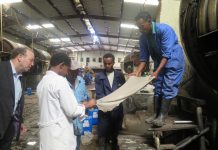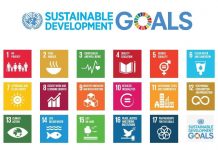We all know “Water is Life.” In addition to being essential for drinking and sanitation, water is a necessary input to all forms of production including agriculture, industry, energy and transport. However, too much uncontrolled water may also obliterate and reverse development in the form of floods, landslides and epidemics, which often have devastating implications, such as loss of lives, damage to property, and reduced GDP. And too little water, in the form of droughts, has similar profound effects.
Even though the great economic return of water investments is well known, we have historically seen less investment than in many other sectors, and the investments are mainly by government with little participation from the private sector. This may be because water is taken for granted, and because we have not reached out and effectively communicated the many ways in which it contributes to development. Another plausible reason for low investment levels is that the limited funding that is available is often not used very effectively, as demonstrated by the many infrastructures that fall into disrepair just a few years after construction…The challenge and opportunity we are faced with now is to absorb this funding in such a way that the expected results are realized in a sustainable manner.
The African Development Bank intends to remain a trusted partner in the funding of this sector, and is already leading by example in this regard. AfDB water and sanitation investments have increased 10-fold in eight years, from US$70 million/year to $700 million/year in 2011. Our water portfolio currently stands at $2.4 billion, financing close to 70 projects on the continent. In Nigeria, the Bank’s water portfolio includes both rural and urban water and sanitation projects and amounts to $277 million. Additional projects are under preparation.
I believe the case for scaling up investments in water and sanitation is very clear, and would like to share some of the support the Bank is providing to its member countries in this regard. We support the development of more appropriate financing mechanisms, tailored to local conditions, in order to raise additional resources and to improve effectiveness of funds already available. In particular, we encourage countries to replicate and scale up pilots of innovative approaches and technologies that have shown positive results. However, stepping away from “business as usual” requires strong and effective political leadership, promoting flexibility.
For urban water utilities we support efficiency improvements to prevent decay and expensive rehabilitation and this includes appropriate billing and the reduction of water losses. Such projects are often self-financing with quick returns, which make them suitable for funding by local financial markets or performance contracts where the contractor is paid based on savings realized. To facilitate access to the financial markets, we are also encouraging utilities to undertake credit ratings.
In rural water supply we have launched a special initiative for “professionalized rural service areas” that provides tools for developing more sustainable operating models that emphasize private-sector participation and life-cycle costing for point water sources and small schemes. The bank is also working on setting up a multi-billion dollar U.S. African Infrastructure Financing Facility to raise funding for large-scale infrastructure programs. The facility will support project development, will issue bonds for investments, and provide guarantees for investors.
Gilbert Mbesherubusa is vice president of The African Development Bank. The above COMMENTARY is an edited excerpt of his remarks at the Presidential Summit on Innovative Funding of the Water Sector, on February 18, 2013, in Abuja, Nigeria













